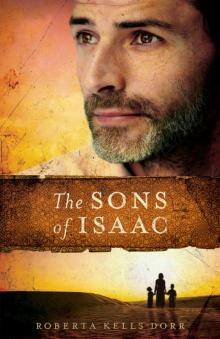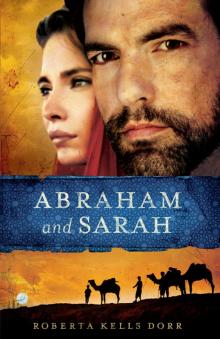- Home
- Roberta Kells Dorr
Honored Page 3
Honored Read online
Page 3
It was taken for granted that I was to go with them. Though I told no one, I had a secret desire to find one of the shepherds who had been out on the hillside that night tending his sheep. I didn’t think this would be a difficult task, since there were many in Bethlehem. I was fascinated by the appearance of angels that kept edging into this story. No one else seemed to realize how strange it was that at every turn these people made, an angel appeared to guide them.
I had gotten the family name of some men who were shepherds. It became evident that this was an occupation inherited by certain families. If the father was a shepherd, then the son would also become a shepherd. It was a hard, tiring job with very little reward. They were practical, silent men who would never imagine anything. If they said they saw an angel, then one could be sure they had seen one.
The day before we left, Mary came and motioned for me to follow her. She led me to a backroom where some of the family belongings were stored. I immediately spotted a small carved chest sitting on a pile of sheep skins. It was clumsily made, with lilies carved into its surface. “He is the lily of the valley” was carved around the outside, while on the inside was the word “beloved” in crude Hebrew script.
“This box is supposed to have belonged to King David when he was a boy,” Mary said. “They say it was carved for him by an old shepherd. As you can see, it is rough and simple. Perhaps that is why no one claimed it and now it is mine. I keep my most prized belongings in it.”
She lifted the lid, and I could see only a fold of white linen and some dark objects. They didn’t seem to be the kind of thing that would be considered prized or special. I wondered why she treasured such things.
“See,” she said as she gently lifted the linen piece out of the box. “This is the swaddling cloth I wrapped him in, and these are the cords that held the cloth in place.” Her eyes sparkled with unshed tears, and I could see that this was indeed a great treasure. I wanted to reach out and touch the cloth but was so overcome by her reverence for it that I drew back instead.
As she folded the cloth and placed it back in the box, I again noticed the dark objects. They looked like straps with small leather boxes attached to them. They seemed very plain and out of place. I couldn’t imagine why they would be in this box. She must have sensed my puzzlement. “These are the tefillin, or phylacteries, he used for prayer,” she said, unfolding the dark objects. “He observed all the laws and customs of our people. In fact, he said, ‘I came not to destroy the law but to fulfill it.’ ”
“I have seen the men here using these when they pray. Does that mean he prayed only in the most formal way?” I asked.
“No, there were many times he went off into the mountains and talked to God, whom he called his ‘heavenly Father.’ ” She gently folded the objects and put them back in the box. “He lived very simply and had few possessions.”
“But he did work with your husband in his carpentry shop,” I said.
“Yes, he made yokes for oxen and frames for windows. Sometimes, when I walk out in the country around Nazareth, I will see oxen plowing, and I wait at the end of the furrow to examine the yoke. I can always tell if he made it. He worked hard to make the yoke fit the animals’ shoulders so the burden they carried was as light as possible. I was always astonished that he cared so much for people and even animals that he would go to extra trouble to make things easier for them.”
I watched her put the box back on a shelf and then turn to leave. “Tomorrow morning early,” she said, “we will leave for Bethlehem. I hope you will not be disappointed.”
“And,” I said, “what do you hope to find in Bethlehem?”
This obviously caught her off guard. She turned around and gave me a long, penetrating look. I could see she had not even dared to ask this of herself. She looked away, and I saw that she was not ready to answer that question. She simply reached out and lightly touched my hand and then hurried out to greet the guests who were continually arriving.
I stood where she had left me and thought about the strangeness of this trip back to Bethlehem. John had told me that after Jesus was born Mary had never returned. She had never even mentioned wanting to go back, and yet now, suddenly, it was something she felt she had to do. I tried to imagine what would induce her to make this journey, and I thought perhaps she wanted to see if the city had changed much in these last years. Even as I entertained the thought, I knew that could not be the reason. There was some other very important reason. It was a long distance to ride on a donkey, and the weather was getting cold and the rains could start any day now.
I didn’t look forward to the journey itself. The Romans were in charge of every road and the many checkpoints, and they were likely to stop us several times and make us unload the animals and wait for their inspectors to come and examine all our belongings. I knew the Romans had strengthened their guard. They suspected little boys and often women of harboring weapons. Even a small caravan advancing toward Bethlehem would not go unnoticed. Every Jew was searched, and when any problem arose, it was a Jew who was brought in for questioning. What the Romans would think of a Greek traveling with Jews, I could not imagine.
We started early in the morning, before dawn. The cobblestone streets of the old city were empty, with only a few shopkeepers arranging their wares. Roosters crowed in far-off courtyards, and the hooves of our donkeys clicked rhythmically on the worn stones. Up ahead an old woman looked down at us from a lighted window and cursed the commotion so early in the morning.
When we came to the Joppa Gate, the Roman soldier refused to let us pass. “These gates remain closed from sundown till sunup. You should know that,” he growled. There was no alternative but to wait in the gatehouse for daybreak.
The road to Bethlehem wound around through a valley where the famous King David had fought many battles with the Philistines. It was called the Valley of Rephaim, or the valley of the giants. From there the road descended to a glen filled with roses still in bloom. We left the glen on a broad path and came to a well where we stopped for a drink of clear, cold water. John explained that the Magi were supposed to have stopped at this well on their way to Bethlehem after seeing King Herod in Jerusalem. The Magi had become uncertain as to where the star was; it seemed to have disappeared while they were in the city. It was only as they bent over this well to get a drink that they saw the star mirrored in the water.
There was only one more important place to stop before coming to Bethlehem. It was the grave of someone called Rachel. She had died a long time ago, but her story was so sad it made everyone pause and say a prayer or pass the tomb in silent meditation. John raised his hand, motioning for us to stop. I saw that Mary had already dismounted and was weeping. Both of her hands were on the rough stones of the tomb, her head bent down between them in overwhelming grief. I moved up next to John and asked him what was happening.
“This is the tomb of our ancestor Jacob’s wife Rachel. She was pregnant with a child she desperately wanted. She only had to make it to Bethlehem and there would have been help, but here, within sight of the village, the child was born and Rachel died. She named the child ‘child of my sorrow.’ Mary was very moved by this story. When she came this way with Joseph and passed by this tomb, she was terribly afraid that the same thing would happen to her. She was already in great pain. She begged Joseph to let her stop. Her pains were intense, and the jolting of the donkey was unbearable. ‘If I die here it is no matter; the child will live,’ she said. ‘That is all that matters.’
“ ‘No,’ Joseph said, ‘you shall not die. We have just a little way further. Our God has chosen you to be the child’s mother, and you will not die.’ He insisted they go on. Even when they reached the village and could find no room, Joseph remained strong and encouraged her. The stable where they finally stopped was dark and bare, but Joseph made it seem a suitable place for the child to be born. He sent for a midwife and returned to Mary’s side as soon as the child was born.”
“And now?” I whispere
d. “Why is she weeping now?”
“Certainly it is out of pity for Rachel and out of gratitude that she didn’t die like Rachel on the road to Bethlehem.”
Mary let John help her back onto the donkey, and our small procession moved on toward the village. As I passed the rough stones piled so neatly over Rachel’s tomb, I also prayed a prayer of thanksgiving that Mary had been allowed to reach Bethlehem and have her baby.
We made one more short stop before we entered the village. It was beside another well not far from the northern gates. It was obviously a well where the shepherds came to water their flocks. I could see the shepherds’ fields below in a great bowl-shaped valley. As we approached we saw an old man sitting on the curb of the well. He had the traditional shepherd’s crook in his hand, but he was obviously too old to go out after the sheep. He evidently still wanted to see them being brought in for the night.
I sat down beside him and edged up on the subject I was so interested in. “Do you belong to the Ben Ezra family?” I asked.
He slowly and painfully turned around and looked at me. His sharp, suspicious eyes were almost hidden by his shaggy eyebrows, and his tousled hair jutted out from under a worn headpiece. His gnarled hands shook as they clutched the crook. “What do you want of the Ben Ezra family?” he asked.
“I was told they have been shepherds here for generations. If I could find one of them, they might be able to tell me about a strange thing that happened one night a long time ago.”
“What kind of thing are you talking about?” he asked. His eyes narrowed, and his whole demeanor became guarded.
“I was told there were angels that appeared over the field, and the shepherds even left their flocks to go into Bethlehem to find the baby they spoke about. Do you know anything about this?” I asked.
“Why are you asking? Who wants to know?” he asked.
“The mother of that baby has come back to visit the stable where he was born. It would mean a great deal to her if she could talk to one of the shepherds who were out tending the sheep that night.”
“Where is she?”
“She is the woman standing beside the well, talking to the young man.”
I noticed that he turned and looked at her, and for a moment I thought I saw an expression of wonder and amazement cross his face. I was almost sure he knew what I was talking about. But when he turned and looked at me, there was the same guarded look I had noticed at first.
“No,” he said. “I don’t know about that. I never heard angels or saw angels.” With that he got to his feet and, leaning heavily on his crook, went down the road toward the village gate.
Of course, I was disappointed. I had hoped that he would be able to lead me to some of the shepherds who had been out on the hillside and heard the angels. He was the right age to have been there himself. I couldn’t understand why he would deny something so simple.
I didn’t have time to ponder the strangeness of the old man’s demeanor, for just at that moment a detachment of Roman soldiers came marching down the road toward the village. The centurion shouted an order, and they came to an abrupt halt in front of the well. “Who is in charge here?” the centurion demanded.
“We are on our way to visit our relatives here in Bethlehem,” John said, stepping forward.
The centurion walked around, poking at the coverings on the donkeys and making the women untie the bundles they carried. When the vegetables spilled out on the ground, he kicked them contemptuously. Then, jabbing his sword into a basket of fruit, he ordered one of his men to take the basket. “They have nothing of interest. Let them pass,” he said.
With that, John helped Mary onto the donkey, and they hurried down the road, passing through the village gates just as they were being closed for the night. Unlike years before when Mary and Joseph had come for the census, the streets were almost empty, and their relatives were waiting for them with roasted lamb wrapped in mint along with melons and a pomegranate drink. They assured us that there was room for all of us for the night.
The next morning John took Mary and me to see the cave where Jesus had been born. It was a cave under a house that often served as an inn when Bethlehem was crowded with visitors. The cave was used for the family’s animals and had some sheep that the shepherds hadn’t yet taken out to pasture. I watched Mary and wondered what she was thinking. She walked around and touched the cool, dark walls. She ran her hand over the manger filled with hay. Suddenly she turned to me with a puzzled look. “Where were the angels when I was suffering so on the long trip down here?” she said. “And couldn’t one of them have managed to find something better for my poor baby’s bed? This is what I have wondered so often.”
It was so unlike Mary to complain that we were all surprised. However, having made the short trip from Jerusalem and then seeing the stable, we were appalled at the difficulties she had faced. She had traveled all the way from Nazareth in the north, and it had been the cold and rainy time of the year. Where were the angels? we all wondered.
As we stood in the stable door, a young boy dashed around the corner of the house and came toward us. “It’s time for me to take the sheep out to pasture,” he said almost breathlessly. “I’m really quite late, but my grandfather insisted on coming with me. He wants to talk to the lady.”
Just as he said that, I saw an old man come hobbling along. He was the same old man who had been sitting by the well the day before. It was obvious that he was trying to hurry. “It’s important,” he gasped. “I must see her; I have to tell her.”
Mary stepped forward, took his elbow, and led him to a bale of hay where he could sit down. “Now,” she said, “what do you have to tell me?”
“I was here on that night. I saw you and the baby. It was just as the angels said it would be,” the old man gasped.
“You saw angels?” I exclaimed. “What did they say?” I couldn’t contain my excitement.
“We were so afraid,” he continued. “The light . . . and then the bright, shining angel suddenly appearing in the light. It frightened all of us.”
“But what did the angel say?” I urged impatiently.
“The angel must have seen how afraid we were, because he quickly said, ‘Fear not,’ several times. Then when we stopped hiding our faces and peering at him through our fingers, he said, ‘I bring you good tidings of great joy.’ I guess we thought he was going to tell us how worthless, evil, and even wicked we were. Instead, he said he was bringing us great joy. Can you imagine that? We were just poor, ignorant shepherds, and he took the time to come and tell us that.”
“Is that all he said?”
“No. Then he told us that a child had been born who was to be our Savior and that he was for all people. He had been born that night right in our village, and we would be welcome to go see him. He wasn’t in one of the big, fancy houses but in a stable, wrapped in swaddling clothes and lying in a manger.”
“And how did it end?” I asked.
“Oh, it was wonderful. Suddenly there was with the angel a great host of angels, praising God and saying, ‘Glory to God in the highest and on earth, peace, goodwill to men.’ I can tell you we took off right away for the village. Left the sheep for the angels to take care of,” he chuckled. “We didn’t lose a one of them. We were so excited that I’m not sure we ever did tell the lady here all that had happened and how we knew about her baby.”
“You didn’t tell all of this to the mother and her husband?”
“Well, you have to understand. Seeing that the angel was right and there really was a baby in swaddling clothes in a manger, we just fell to our knees in awe and wonder. I don’t know what we said.”
“Why didn’t you tell us all of this when I saw you at the well yesterday?”
“I was too frightened. I didn’t know who you were, and even when I saw the lady I didn’t recognize her.”
Mary came over to the old shepherd and gently touched his arm. “Thank you so much for coming and telling me all of this. That night I
was so busy with the new baby, and you were so shocked at actually finding us here, that I never really did understand about the angels’ appearance.” With that, she asked him to tell his story over and over again, and I could tell that his message answered some of her questions.
After the old shepherd left, Mary sat down on one of the bales of straw and looked around at each of us. “Well. That’s where the angels were that night. They must have known I was too busy with a new baby to really hear and remember their message. How wonderful that they entrusted the message to the shepherds. Shepherds never forget anything.”
“And,” said John, “if you had been in a palace or an inn rather than in the stable, the shepherds would not have been able to come to see that there really was a baby in a manger.”
Mary sat pondering all that had happened. She had been deeply moved by the old shepherd’s story. “The angels are always saying, ‘Don’t be afraid,’ and yet we are so often afraid,” she said.
John had noticed something else of importance. “They are also always reminding us that they want to bring us joy—great joy. How sad that we have so much difficulty remembering such things when we are in some dark valley.”
For myself, I could hardly wait to return to Jerusalem, where I could retire to the room they had given me and write to Theophilus about all of this. It was a good ending to my first visit to Jerusalem and Bethlehem. In a few days I would be returning to Antioch. And perhaps someday I would come back to visit my many friends in Palestine.
A Word from the Author
Some years ago when I was living in the Middle East, I had a memorable experience in Jerusalem. My friend, who worked with the United Nations and lived in Jerusalem, offered to take me to her favorite site.
“I am sure,” she said, “you have never been there, since most people don’t even know it exists.” Of course, I was curious and eager to go with her. She was delighted. We started off at a quick pace over narrow cobblestone streets, up dark allies, around crumbling walls and locked gates. She stopped to let me catch up. “This is the al-Mujahideen Road,” she said. “It leads straight to the Lion’s, or St. Stephen’s, Gate.”

 Honored
Honored The Sons of Isaac
The Sons of Isaac Abraham and Sarah
Abraham and Sarah Queen of Sheba
Queen of Sheba